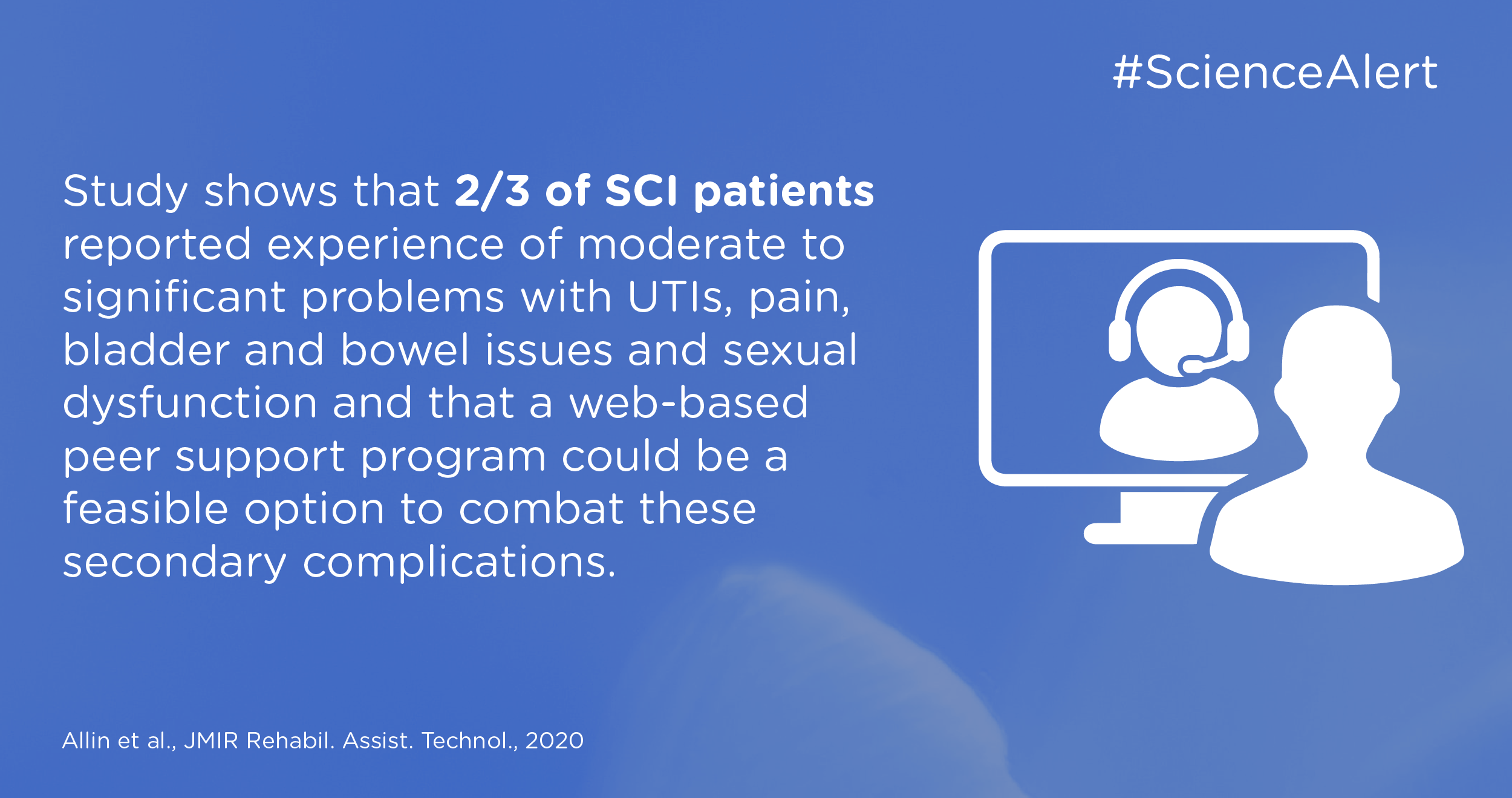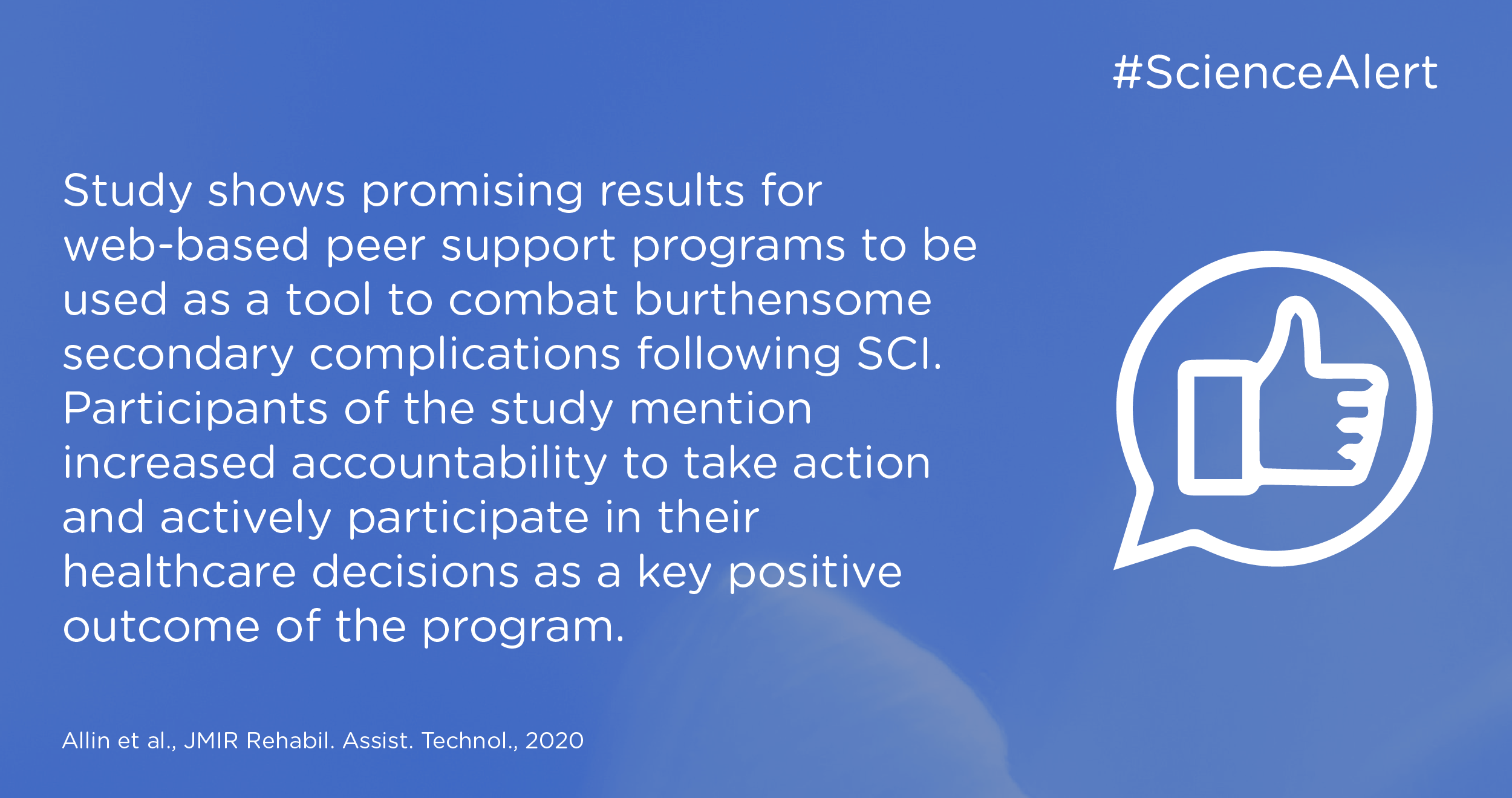In this article Allin et al. explores the feasibility and potential impact of health-coaching support for individuals with spinal cord injury (SCI).
 Sonya Allin, John Shepherd, Teri Thorson, Jennifer Tomasone, Sarah Munce, Gary Linassi, Christopher B McBride, Tizneem Jiancaro and Susan Jaglal. JMIR Rehabil Assist. Technol., 2020
Sonya Allin, John Shepherd, Teri Thorson, Jennifer Tomasone, Sarah Munce, Gary Linassi, Christopher B McBride, Tizneem Jiancaro and Susan Jaglal. JMIR Rehabil Assist. Technol., 2020
People with SCI are at higher risk of experiencing secondary conditions like pressure injuries and bladder- and bowel complications. Traditional peer support programs have proven to be insufficiently tailored to the needs of individuals with SCI. To overcome those barriers, a web-based, self-management program was developed for individuals with SCI. This web-based coaching was evaluated in a pilot study and the results identified that peer support coaches were valued for their ability in facilitating behavior change and that this type of web-based, peer support program demonstrated a positive impact on the health for SCI individuals and also to avoid secondary complications.
What are the complications of spinal cord injury?
Individuals living with SCI have a high risk of experiencing secondary conditions and complications due to their injury. Even up to 20 years after the injury, rehospitalization rates for people with SCI remain over 30%. Typically, the problems can be related to bladder- and bowel management or pressure injuries. In addition, urinary tract infections (UTIs) are common complications with the potential to lead to severe consequences and to have a huge negative impact on the quality of life.
How to reduce secondary complications in spinal cord injured individuals?
To reduce this, people with SCI require knowledge about their injuries and strategies to mitigate risks. More specifically, knowledge and skills related to the management of symptoms, treatment, physical and psychosocial consequences as well as lifestyle changes inherent in living with a chronic condition, are required. However, evidence suggests that knowledge and access to self-management tools are inadequate and that less than half of the SCI patients leave the hospital without clinically adequate knowledge about e.g. bladder injury management. Lack of knowledge is not the only barrier to self-care in the community; physical barriers, costs, lack of motivation as well as pain, also complicate the efforts to independently monitor and maintain health.
What is peer support?
One identified solution in the attempts to decrease burthensome secondary complications after a SCI is to connect the individual to a peer, a person in similar situation. Peer support are self-management support programs that are community-based tools designed to increase the knowledge and skills required to independently manage a chronic condition. In addition to this, the programs are designed to potentially fill some care gaps which cannot be fulfilled by the healthcare providers (nurses, doctors etc.) or support by family members. These programs are led by people with the lived experience of a chronic condition and they are called peer support officer or peer coaches. Peer-led programs have been associated with positive health outcomes and shown e.g. improvements in self-efficacy, health-related quality of life, lower hospitalization rates and reduced health care expenditures. However, also some shortcomings have been identified for community members with SCI. Studies have shown that individuals with SCI prefer web-based programming over in-person programming and content tailored to SCI management.
What does online peer support mean?
In response to the explored interest and need for web-based self-management support, a web-based program for users with SCI was developed at the University of Toronto, Canada. This program is called SCI & U and is part of a growing family of web-based support interventions for SCI. The program consists of highly structured interactions between participants and trained peers with SCI. Peer coaches have been perceived by participants as powerful motivators for behavior change and relevant, credible mentors for skill development. Peer mentoring after an SCI, on its own, has been associated with improved confidence in self-management skills and reduced hospital admissions. The peer health coaches included in this study were trained in the use of both the motivational interviewing (MI) and brief action planning (BAP) techniques. This provides additional strengths which have been shown to encourage the SCI individuals to actively participate in their health care decisions.
Results from Patient support program
In the pilot study by Allin et al. 11 SCI patients were included and both quantitative methods (validated questionnaires) and qualitative methods (one to one interviews) were used. The study focused on relatively short-term outcomes (<12 weeks). The experience of secondary health complications was measured via self-reports on validated questionnaires. The results showed that more than two-thirds reported that they had moderate or significant recent problems with urinary tract infections, pain, bladder- and bowel issues as well as sexual dysfunction. Descriptions of dietary changes were common, as well as changes in fluid intake specifically related to bladder health. Reflections by the authors are that the impact on bowel dysfunction may be indirectly related to these changes.

The experienced effects of peer support
The participants frequently mentioned the supportive roles played by their coaches, and they were credited as being sources of accountability, inspiration and encouragement for improved health. The participants frequently mentioned the fact that the program had increased their accountability to plan for behavior change, and that their coach had played a critical role in fostering this accountability. Being available to listen and check in on plans motivated many participants to take action. The coaches were also described as affirming and supporting of the participants, even when plans did not go as expected. In addition, interactions with coaches were often valued as social support.
He [said] “what are your goals this week” and “I’ll check up on you in the next week or in two weeks and we’ll talk about it”. So, every conversation was like, “hey, I did this and I accomplished this”, which made it that much more interesting to get back to each other and talk.
- [Number 2]
Why is peer support important?
These results show the importance of a peer support program to encourage individuals with SCI to find motivation to take actions for their health and avoid complications which might be totally unnecessary. The web-based format is preferred and allows discussions of sexuality and other sensitive topics. Web based peer support is indicated as a tool to bolster existing community-based support for people with SCI, particularly for those in small or rural communities. Diet and exercise were the most popular topics of discussion during the coaching sessions in the current pilot, but also issues such as pain, bowel dysfunction and sexuality were frequently selected as discussion topics by the participants. The users in this study elected to set goals 30% of the time, indicating engagement with program activities.
What does the future bring?
The results from the current pilot study will be validated in an ongoing randomized clinical trial which will compare the effects of the SCI & U intervention over the span of a year on an experimental group and relative to wait-listed controls. Already in the current pilot study an overall preference for the web-based set up of peer support was established. The participants prefer mainstream, community-based videoconferencing tools (e.g., Skype, Face Time, and Zoom). The topic of the use of videoconferencing software in the context of community-based research projects like this one is an increasingly controversial topic, particularly in the light of revelations regarding potential security loopholes.
Learn more
Want to read more articles like this or learn more about peer support and spinal cord injury? Click the button below:




